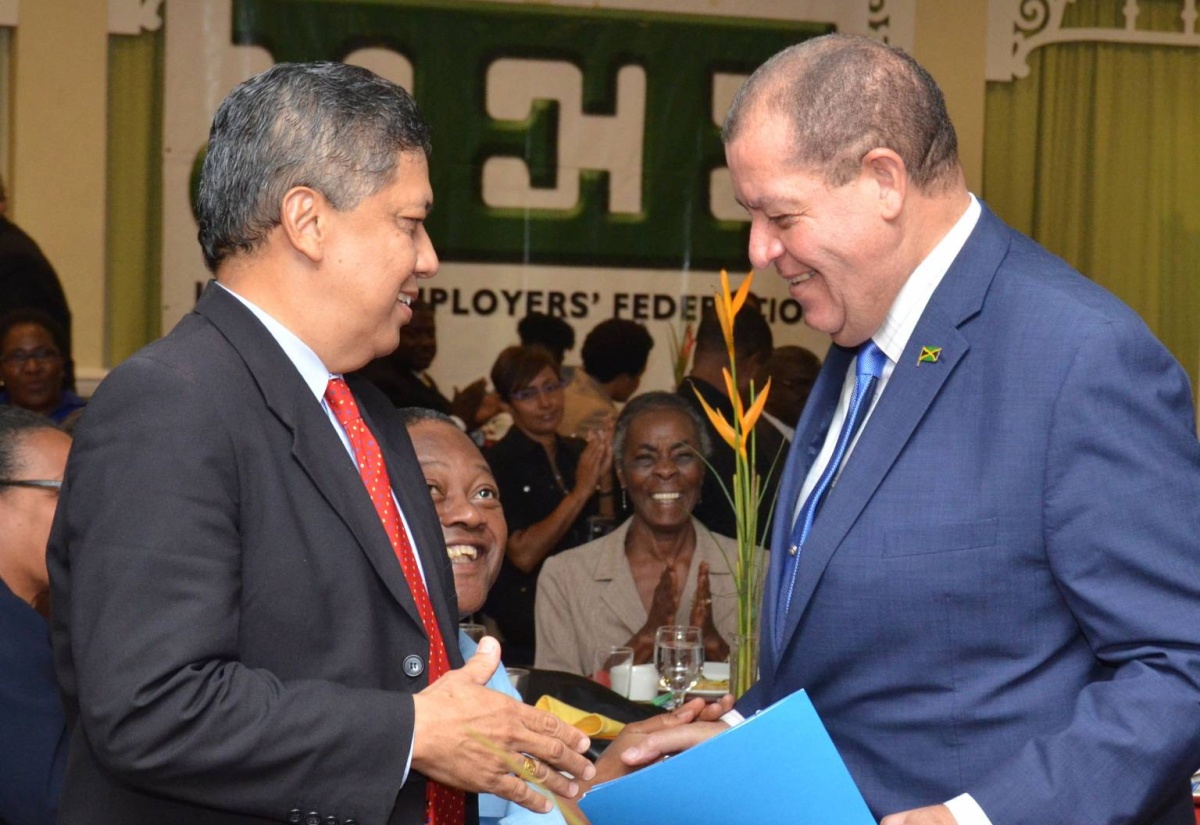Private-Sector Leaders Support Standby Successor Agreement
By: , November 11, 2016The Key Point:
The Facts
- Notable among these, Jamaica Chamber of Commerce (JCC) President, Warren McDonald, tells JIS News, is the economic stability, consequent on measures implemented by the current and previous Administrations.
- Small Businesses Association of Jamaica (SBAJ) President, Hugh Johnson, also points to fiscal discipline as a major highlight of the EFF, while noting that the organisation and its members endorse the standby successor agreement.
The Full Story
Several private-sector leaders have endorsed the Government’s decision to negotiate a standby successor agreement with the International Monetary Fund (IMF).
They deem this as ideal, based on several economic gains recorded under the outgoing four-year Extended Fund Facility (EFF), which are yielding significant benefits for the country.
Notable among these, Jamaica Chamber of Commerce (JCC) President, Warren McDonald, tells JIS News, is the economic stability, consequent on measures implemented by the current and previous Administrations.
He cites fiscal prudence, debt management, reduced inflation and significant Net International Reserves (NIR) among the positive factors influencing Jamaica’s improved economic framework.
The JCC President notes that these have resulted in improvements in the country’s international ranking as a place of choice to do business. Additionally, he says business and consumer confidence locally is at its highest level in a number of years.
Mr. McDonald points out that the JCC’s business and consumer indices indicate that “people feel the time is (now) right to invest in Jamaica”.
“Where you have locals with that perception, it normally spreads to the international community,” the President says.
The President tells JIS News that while the proposed US$1.7-billion standby agreement, for which approval is being awaited from the IMF Executive Board, incorporates some stipulations outlined in the EFF, “it’s more of an insurance-type policy for contingencies to cover external and other unforeseeable shocks”.
“I think that it will reassure investors that even if we have hurricane or an earthquake, because we have these funds available, we should be able to ride it out… so it will be less risk for them,” he adds.
Noting that the pending agreement encompasses several initiatives proposed by the Economic Growth Council, Mr. McDonald says the business sector believes that the Government is on the right track in pursuing it.
“The business community is receptive of it and understands the reasons for this action. So, I would say it is positive and we look forward to growth in the Jamaican economy. We just need to try and ensure that the initiatives are implemented, so that we don’t have to look back and say we haven’t accomplished much,” he says.
Jamaica Manufacturers’ Association (JMA) President, Metry Seaga, also underscores the importance of having a standby agreement as a precaution against shocks.
“It’s like getting an overdraft (for) a company that is in good shape, The country, fiscally, is in good shape now; so we are getting an overdraft in case anything major happens. So it is a good thing to have,” he argues.
Mr. Seaga, however, urges caution on the Government’s part in taking any decision to draw from the proposed facility’s US$1.7 billion.
“I would implore the Government to use it only if it is necessary. As a matter of fact, I would implore them to communicate with the private sector and other stakeholders before actually using it, if necessary,” the JMA President emphasises.
“We have done the hard work; what we need now is the growth that the Government has been speaking of. I am confident that if the Economic Growth Council’s recommendations are implemented, we will certainly get the level of growth that we are looking for,” he says.
For his part, Jamaica Employers’ Federation (JEF) President, David Wan, says the EFF served to “institutionalise” some “very necessary discipline” in the
Government’s financial affairs. This, he notes, has resulted in debt reduction and the generation of primary surpluses within the Budget that have contributed to this decline.
Mr. Wan further points out that reduction in the debt burden has also been aided to some extent by the Government’s buy-back of the Venezuelan debt under the PetroCaribe Agreement.
“So the debt, which was in the 140 per cent range at the outset, is now down to 120 per cent. A concurrent benefit, which is not so much because of the programme, is the drop in energy prices that has brought inflation down to record lows. So, I think this programme has been very good,” the JEF President adds.
Meanwhile, Mr. Wan welcomes the standby successor programme, which he describes as an insurance policy.
He cites the healthy state of the NIR, which stands at well over US$2 billion, arguing that it is “more than adequate” for balance of payment support. Hence, he adds, “we don’t need to keep borrowing more money for this”.
Consequent on these developments, Mr. Wan paints a very positive outlook for Jamaica’s economy for several reasons.
The foremost, he informs, is the record interest rates being offered by a number of financial institutions. This, the JEF President says, should enable the productive sector to access loans at a much lower costs, compared to a decade ago.
While he believes that private-sector loan rates “can come down some more”, Mr. Wan is, nonetheless, satisfied that they are “moving in the right direction”.
Additionally, he says with the prevailing low inflation rate, “we are able to have more predictability in our costs… and that helps business”.
Small Businesses Association of Jamaica (SBAJ) President, Hugh Johnson, also points to fiscal discipline as a major highlight of the EFF, while noting that the organisation and its members endorse the standby successor agreement.
He emphasises the need for more focus by the Government on further developing the small-business sector, through more equitable distribution of resources and benefits to facilitate sustainable growth.


